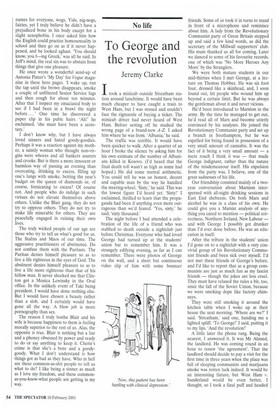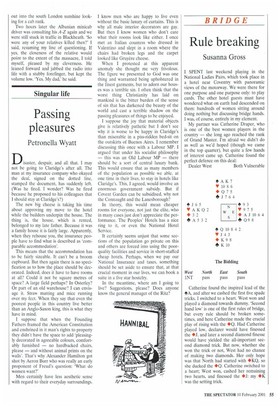No life
To George and the revolution
Jeremy Clarke
Itook a minicab outside Streatham station around lunchtime. It would have been much cheaper to have caught a train to West Ham, but I was stoned and couldn't face the rigmarole of buying a ticket. The minicab driver had never heard of West Ham. Before setting off he studied the wrong page of a brand-new A-Z. I asked him where he was from. 'Albania,' he said.
The traffic was terrible. It would have been quicker to walk. After a quarter of an hour I broke the silence by asking him for his own estimate of the number of Albanians killed in Kosovo. (I'd heard that the final death toll wasn't as high as some had hoped.) He did some mental arithmetic. You could tell he was an honest, decent and capable man by the way he handled the steering-wheel. 'Sixty,' he said. This was the lowest figure I'd heard yet. 'Sixty!' I exclaimed, thrilled to learn that the propaganda had been if anything even more outrageous than we'd feared. 'Yes, sixty,' he said, 'sixty thousand.'
The night before I had attended a celebration of the life of a friend who was stabbed to death outside a nightclub just before Christmas. Everyone who had loved George had turned up at the students' union bar to remember him. It was a strangely edifying evening, as far as I can remember. There were photos of George on the wall, and a short but continuous video clip of him with some bouncer friends. Some of us took it in turns to stand in front of a microphone and reminisce about him. A lady from the Revolutionary Communist party of Great Britain stepped up and said a few kind words, as did the secretary of the Millwall supporters' club. His mum thanked us all for coming. Later we danced to some of his favourite records, one of which was 'No More Heroes Any More' by the Stranglers.
We were both mature students in our mid-thirties when I met George, at a lecture on Thomas Hobbes. He was six foot four, dressed like a skinhead, and, I soon found out, hit people who wound him up beyond a certain limit. But he was always the gentleman about it and never vicious.
He'd been introduced to Marxism in the army. By the time he managed to get out, he'd read all of Marx and become utterly convinced by his analyses. He joined the Revolutionary Communist party and set up a branch in Southampton, but he was expelled for being found in possession of a very small amount of cannabis. It was the fact of it being a very small amount — a mere roach I think it was — that made George indignant, rather than the nature of the misdemeanour itself. His expulsion from the party was, I believe, one of the great sadnesses of his life.
Our friendship consisted mainly of a twoyear conversation about Marxism interspersed with all-night drinking sessions in East End shebeens, On both Marx and alcohol he was in a class of his own. He could give you a Marxist analysis of anything you cared to mention — political correctness, Northern Ireland, New Labour — and with George I possibly got drunker than I'd ever done before, He was an education in itself.
After the tribute in the students' union I'd gone on to a nightclub with a very convivial group of his Revolutionary Communist friends and been sick over myself. I'd not met these friends of George's before, and I'd like to report that as a group communists are just as much fun as my fascist friends — though the jokes are less cruel. They must have relaxed the rules a bit, too, since the fall of the Soviet Union, because we were smoking dope like factory chimneys.
They were still smoking it around the kitchen table when I woke up at their house the next morning. 'Where are we?' I said. 'Streatham,' said one, handing me a lighted spliff. `To George!' I said, putting it to my lips. 'And the revolution!'
A little later the phone rang. Being the nearest, I answered it. It was Mr Ahmed, the landlord. He was coming round in an hour to renew 'the agreement'. That the landlord should decide to pay a visit for the first time in three years when the place was full of sleeping communists and marijuana smoke was rotten luck indeed. It would be an interesting fixture, but West Ham v. Sunderland would be even better, I thought, so I took a final puff and headed Out into the south London sunshine looking for a cab rank.
Two hours later the Albanian minicab driver was consulting his A-Z again and we were still stuck in traffic in Blackheath. 'So were any of your relatives killed then?' I said, resuming my line of questioning. If yes, the closeness of the relative would point to the extent of the massacre, I told myself, pleased by my cleverness. He leaned forward and jabbed the radio into life with a stubby forefinger, but kept the volume low. 'Yes. My dad,' he said.



































































 Previous page
Previous page